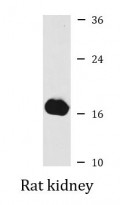ARG57948
anti-GRP / Gastrin releasing peptide antibody
anti-GRP / Gastrin releasing peptide antibody for ICC/IF,IHC-Formalin-fixed paraffin-embedded sections,Western blot and Human,Mouse,Rat
Overview
| Product Description | Rabbit Polyclonal antibody recognizes GRP / Gastrin releasing peptide |
|---|---|
| Tested Reactivity | Hu, Ms, Rat |
| Tested Application | ICC/IF, IHC-P, WB |
| Host | Rabbit |
| Clonality | Polyclonal |
| Isotype | IgG |
| Target Name | GRP / Gastrin releasing peptide |
| Antigen Species | Human |
| Immunogen | Recombinant fusion protein corresponding to aa. 1-148 of Human GRP (NP_002082.2). |
| Conjugation | Un-conjugated |
| Alternate Names | preproGRP; proGRP; GRP; BN; Gastrin-releasing peptide; GRP-10 |
Application Instructions
| Application Suggestion |
|
||||||||
|---|---|---|---|---|---|---|---|---|---|
| Application Note | * The dilutions indicate recommended starting dilutions and the optimal dilutions or concentrations should be determined by the scientist. | ||||||||
| Positive Control | Rat kidney | ||||||||
| Observed Size | 16 kDa |
Properties
| Form | Liquid |
|---|---|
| Purification | Affinity purified. |
| Buffer | PBS (pH 7.3), 0.02% Sodium azide and 50% Glycerol. |
| Preservative | 0.02% Sodium azide |
| Stabilizer | 50% Glycerol |
| Storage Instruction | For continuous use, store undiluted antibody at 2-8°C for up to a week. For long-term storage, aliquot and store at -20°C. Storage in frost free freezers is not recommended. Avoid repeated freeze/thaw cycles. Suggest spin the vial prior to opening. The antibody solution should be gently mixed before use. |
| Note | For laboratory research only, not for drug, diagnostic or other use. |
Bioinformation
| Database Links | |
|---|---|
| Gene Symbol | GRP |
| Gene Full Name | gastrin-releasing peptide |
| Background | This gene encodes a member of the bombesin-like family of gastrin-releasing peptides. Its preproprotein, following cleavage of a signal peptide, is further processed to produce either the 27 aa gastrin-releasing peptide or the 10 aa neuromedin C. These smaller peptides regulate numerous functions of the gastrointestinal and central nervous systems, including release of gastrointestinal hormones, smooth muscle cell contraction, and epithelial cell proliferation. These peptides are also likely to play a role in human cancers of the lung, colon, stomach, pancreas, breast, and prostate. Alternative splicing results in multiple transcript variants encoding different isoforms. [provided by RefSeq, Jul 2008] |
| Function | GRP stimulates gastrin release as well as other gastrointestinal hormones. Operates as a negative feedback regulating fear and established a causal relationship between GRP-receptor gene expression, long-term potentiation, and amygdala-dependent memory for fear (By similarity). [UniProt] |
| Cellular Localization | Secreted. [UniProt] |
| Calculated MW | 16 kDa |
Images (1) Click the Picture to Zoom In






